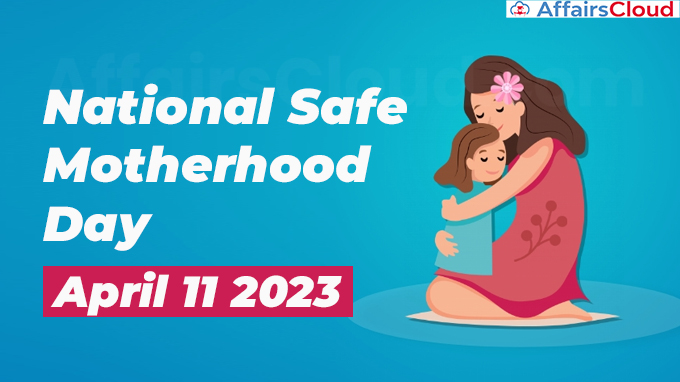 National Safe Motherhood Day is annually observed across the globe on April 11 to promote awareness about the importance of having proper access to healthcare during the various stages of pregnancy and motherhood.
National Safe Motherhood Day is annually observed across the globe on April 11 to promote awareness about the importance of having proper access to healthcare during the various stages of pregnancy and motherhood.
The day also marks the birth anniversary of Kasturba Gandhi (1869-1944), wife of Mohandas Karamchand Gandhi and a great freedom fighter and social reformer.
- 11th April 2023 marks the 154th birth anniversary of Kasturbai Gandhi. She was born on 11 April 1869, in Porbandar, British India(now in Gujarat).
National Safe Motherhood Day was initiated by the White Ribbon Alliance India (WRAI), a grassroots movement for the health and rights of women and newborns.
Background:
i. In 2003, the Government of India (GoI) declared April 11 of every year as National Safe Motherhood Day to promote maternal health and reduce maternal mortality.
ii. 1st National Safe Motherhood Day was observed on 11th April 2003.
iii. India was the 1st country to observe National Safe Motherhood Day.
Maternal Mortality:
i. Maternal mortality refers to deaths due to complications from pregnancy or childbirth.
ii. According to United Nations (UN) inter-agency estimates, the global maternal mortality ratio (MMR) declined by 34% (from 342 deaths to 223 deaths per 1 lakh live births) from 2000 to 2020.
iii. About 2,87,000 women died during and following pregnancy and childbirth in 2020.
- In 2020, low and lower-middle-income countries accounted for about 95% of all maternal deaths, most of which could have been avoided.
iv. Women in sub-Saharan Africa have the highest probability of dying in their lifetime (1 in 41), which is around 268 times higher than in Western Europe. (1 in 11,000).
Maternal Mortality Rate in India:
i. The MMR in India decreased from 103 per 1 lakh live births in 2017–2019 to 97 per 1 lakh live births in 2018–2020.
ii. 7 Indian States have very high maternal mortality. These are Rajasthan, Uttar Pradesh, Madhya Pradesh, Chhattisgarh, Bihar, Odisha, and Assam.
- ‘Very high’ MMR means 130 or more maternal deaths per 100,000 live births.
About the White Ribbon Alliance India (WRAI):
i. WRA India, an alliance of around 1800 organisations, is comprised of individuals, organisations, champions, researchers, health professionals, and government officials, WRA India’s extensive coalition membership is coordinated by a Secretariat housed by a member organisation, the Centre for Catalyzing Change (C3).
ii. WRA India operates as a convener of the national movement, overseeing six state alliances in Rajasthan, Assam, Jharkhand, Maharashtra, West Bengal, and the Regional Alliance of Haryana, Punjab, and Chandigarh.
Chief Executive Officer (CEO)- Kristy Kade




